Here is the project written which describes what it might be like for the Apostle Paul to arrive in Todmorden, West Yorkshire, in 2020. What follows is my presentation of that essay.
I wonder what Paul would have made if he were to travel to Todmorden. Here I look at such a possibility through the lens of Acts 17 and his journey through Athens.
As a Deacon I am encouraged to…
“walk permeable boundaries between [and with] the gathered community and wider neighbourhoods, to speak a language that can help each to be understood, to be challenged and enriched with each other”
Revd Sam Wells, Incarnational Mission
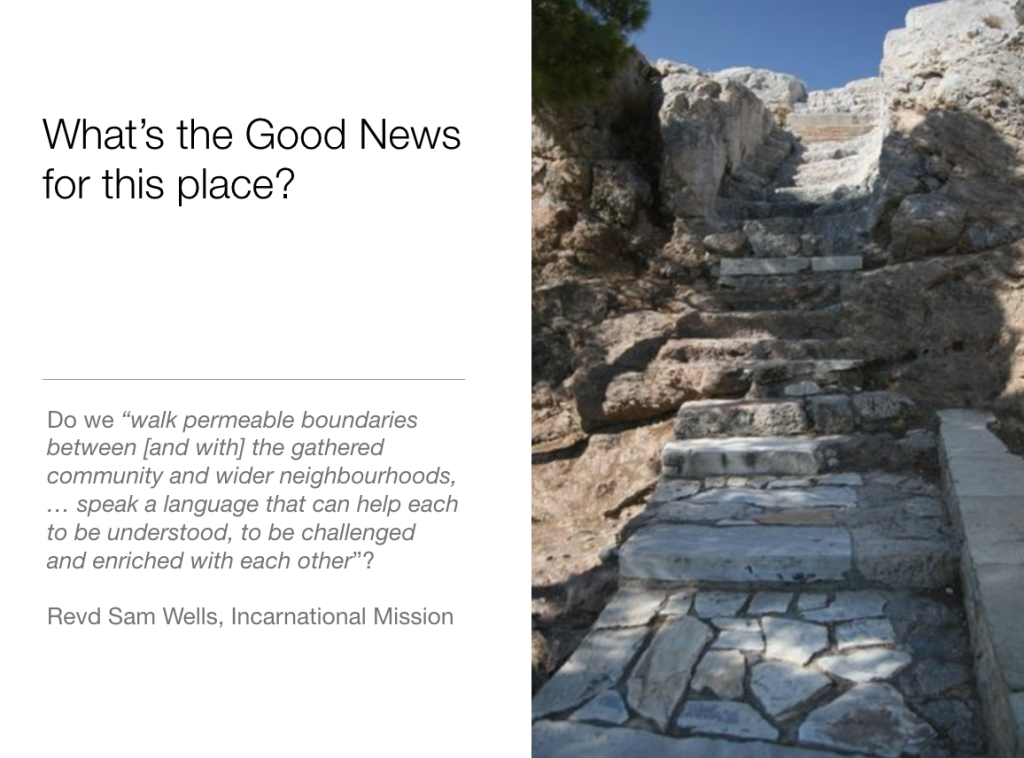
Looking much like architecture from the distant past, the Town Hall is a prominent landmark in Todmorden. Amidst the old industrial mills , which have been in decline since WW2, a heady mix of spiritualism and atheism exists.
If we engage and encounter life with the other, then perhaps we may find Christ in each other.
Liquid Church, Pete Ward

Paul, initially of course a traditionalist, a Pharisee, taught under possibly Rabbi Shammai originally, which might explain his pronounced evangelistic zeal towards Gentiles, and then Rabbi Gamaliel’s instruction where Paul was one of inclusion . We speak of conversion, whereas Paul was always a Jew but now a Christian as well. Luke’s depiction within Acts highlights the mystery and wonder of the ‘The Way’ the development of Christian thought and belief in Southern Europe.
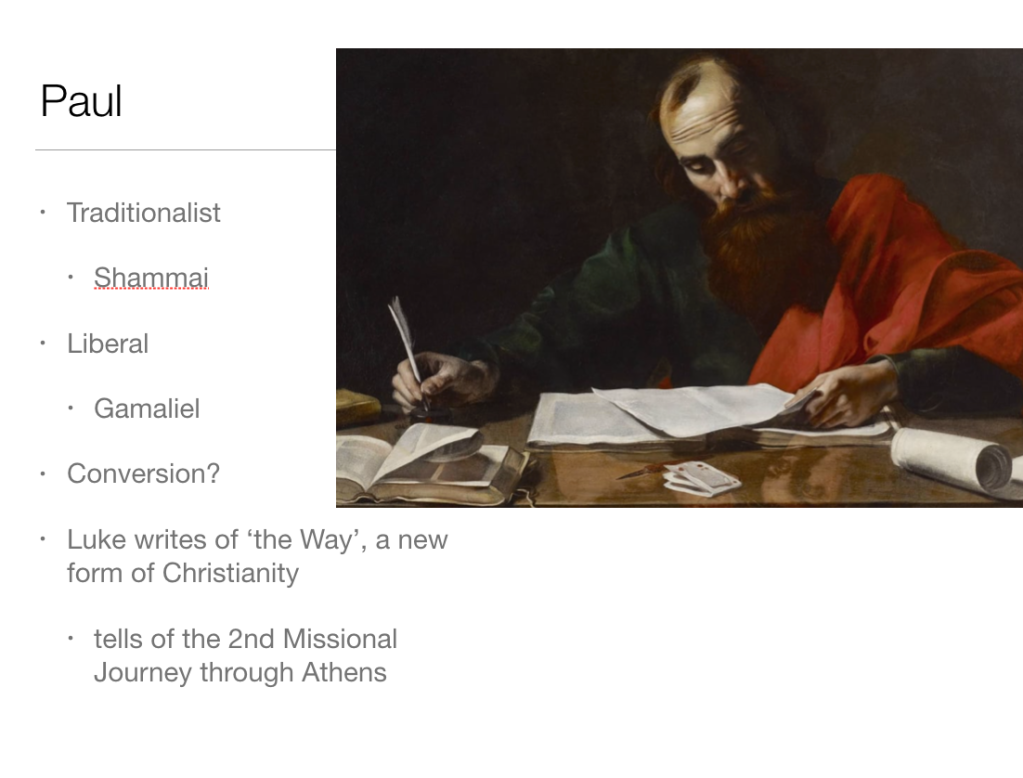
Yes, it was collaborative work. Men, and I would say women as well – albeit not named often here – working alongside Paul. He encourages, Barnabus of course, and here Silas and Timothy, and Luke? Did Luke really join Paul in Athens?
As Paul enters into these places we find a reticence to engage from the very people he might expect support, the Jews; but elsewhere, the people are intrigued.
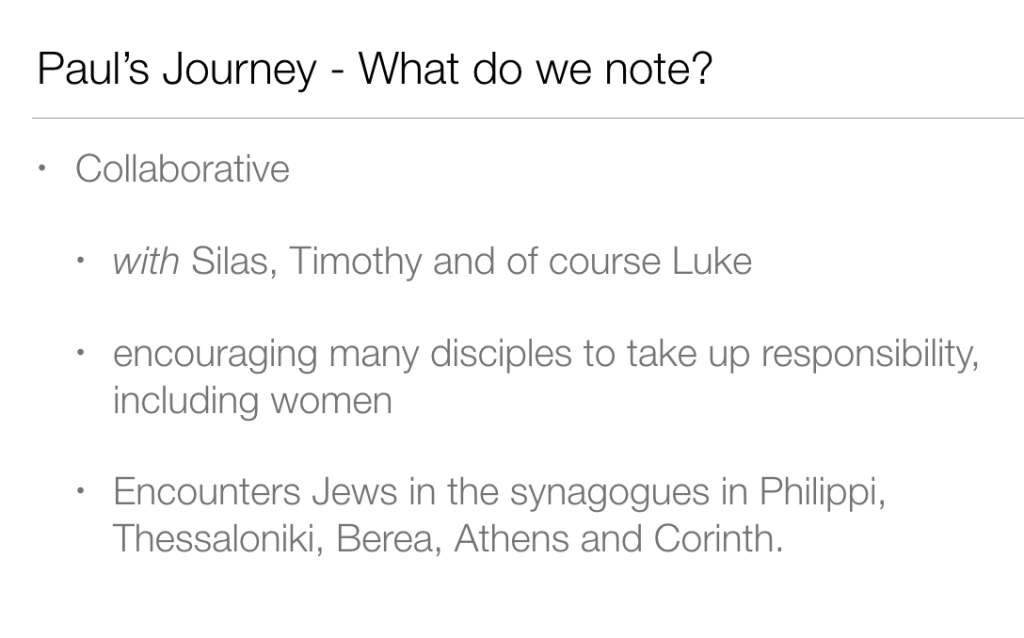
Note the population, similar then to what is now in Todmorden. Both places were in decline, albeit one was principally academic, the other industrial. One thing which may be in common is the mix of cultures, philosophies. The Stoics, akin to mysticism and the spiritualists of today: a tension between heightened reason and baser passions
and the Epicureans, the Nike’s of today – just do it: Atheistic materialists.

We also have to consider the perspective of the Romans: deeply polytheistic, scathing of this Christian ‘cult’, not able to understand Paul’s philosophy – so Paul subverts this blockage. He speaks of their philosophy. He engages in their terms.
There is some contrast in the way that Paul writes for he describes pagans as monotheistic in Romans; but polytheistic in Acts; they are ignorant of the one true God in Romans, but not in Acts; God punishes in Romans but overlooks their errors in Acts.
Bevans offers an interesting consideration into such societal mixes.
In terms of the people, that anthropological perspective, Paul speaks of the Athenian culture, giving value to what they believe.
He then translates the Christian Good News into terms that they understand, setting it in that specific context and culture – known as ‘Encounter and Engage’
This allows the principle of the Overton Window: whereby two parties opposed in views can share some common ground/understanding. If they are willing to hear of the ‘other ‘ argument, then this common understanding grows, relationships abound.
Paul’s proclamation is not a one-off, but one that continues, building in that relationship, hoping for a new community. That is the practical way forward.

Paul has to consider the Host and the Guest conundrum: When we are in church: are we the Host or the Guest? Who do we relate to our ‘audience’? Paul, here, connects to his Gentile audience, rare within the Book of Acts.
How might we do this today? In our services, our hymns and our liturgy?
In my time in Todmorden, we have continued to engage and encounter, to seek to build relationships with those inside of the church, and outside of the church, those who may have once attended but do not anymore, with those who have never engaged before.
We might critique Paul’s journey to Athens citing the lack of a new emerging Christian building, I wonder whether Paul was, actually, looking for a community to grow here: is that our hope also?
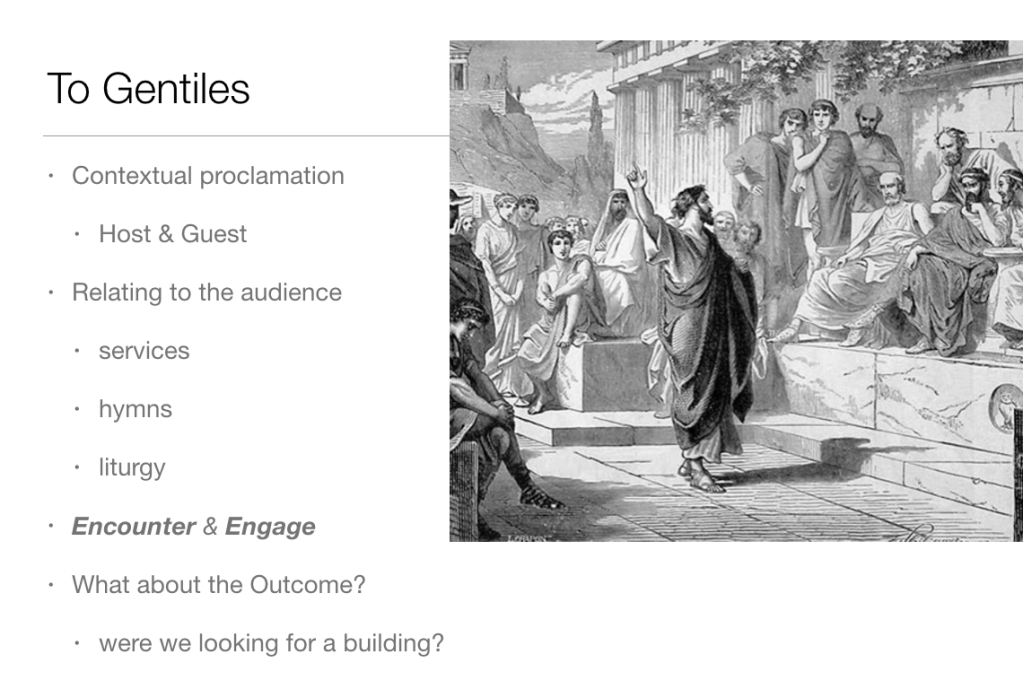
So we have engaged many different groups, in different locations.
We try to meet the needs of the community, we do not impose ‘church’ upon them. We bring together parties such as the pubs and the LGBTQ community to create safe places (bottom centre below); discuss issues which are relevant but not engaged elsewhere and see where faith is entwined – done monthly at Todmorden Faith (top right below); build links across the town with Interfaith Chaplains, linking Muslims and Christians, showing that we can work together and listen to our community, listen where they rarely have that opportunity before: all putting faith on the agenda (bottom right below); and we are seeking to develop discipleship in new ways, with the What If Bible Study groups (bottom left below), looking to ‘dare to imagine’ what Church might look like.
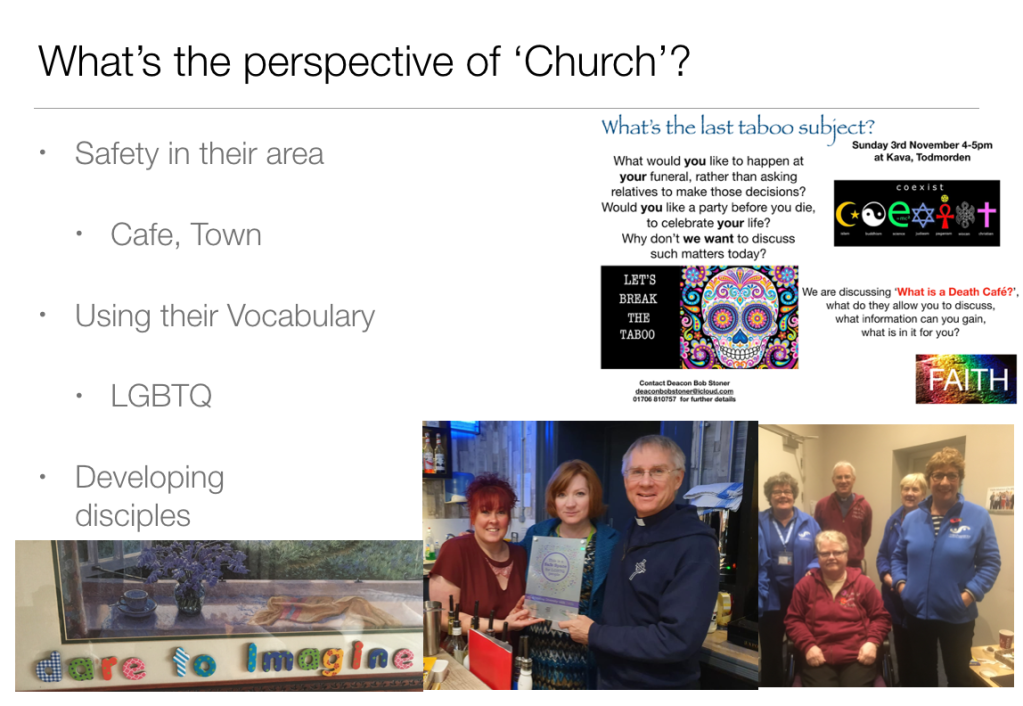
We have also sought to develop leadership teams within Todmorden Faith, so the core team can continue its work when I go. We have developed that team of interfaith chaplains who are linked to Councils and to other chaplaincies in Liverpool, St Helens, Warrington and Halifax. We are working with the congregation of the Methodist Church, amidst challenging times, engaging the Churches Together in Todmorden and also the lay pastors of local churches to develop stronger ties, to be integrated within this community.
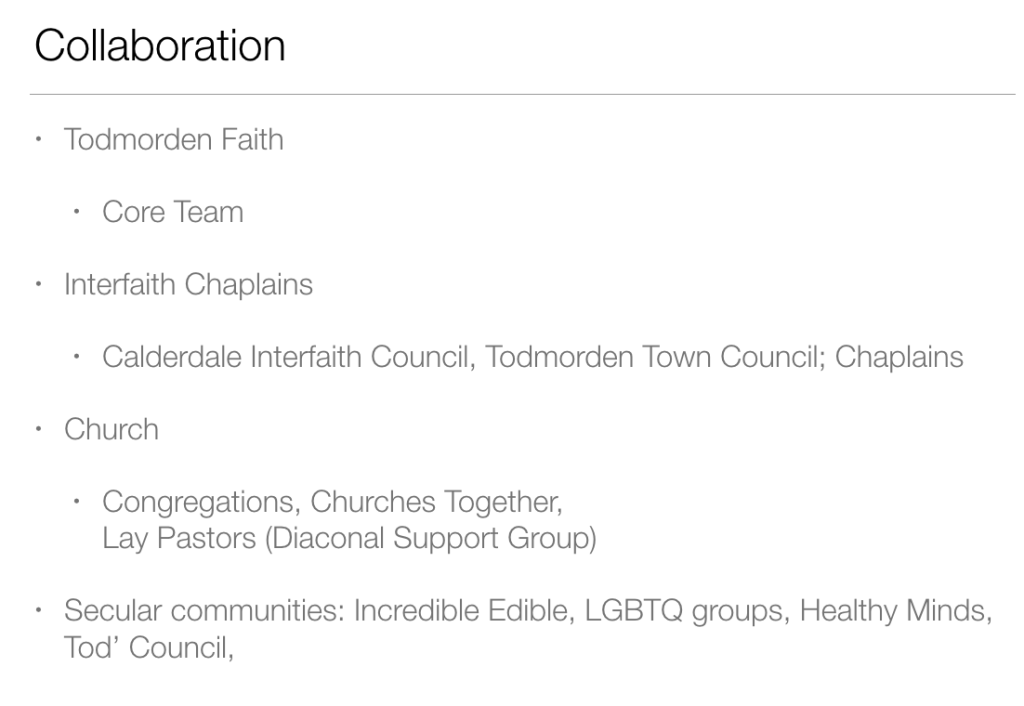
Wow! what to have a church integrated into the society: the guest being welcomed by the host.
So in conclusion, the good news is not only found in the Church building but where we are looking to engage and encounter people where they are.
It is meeting them in their context, their setting, speaking using their terminology but importantly ‘being’ with them : in that truest sense. It is walking alongside that we truly make connections, sharing the Good News.
If we engage and encounter life with the other, then perhaps we may find Christ in each other.
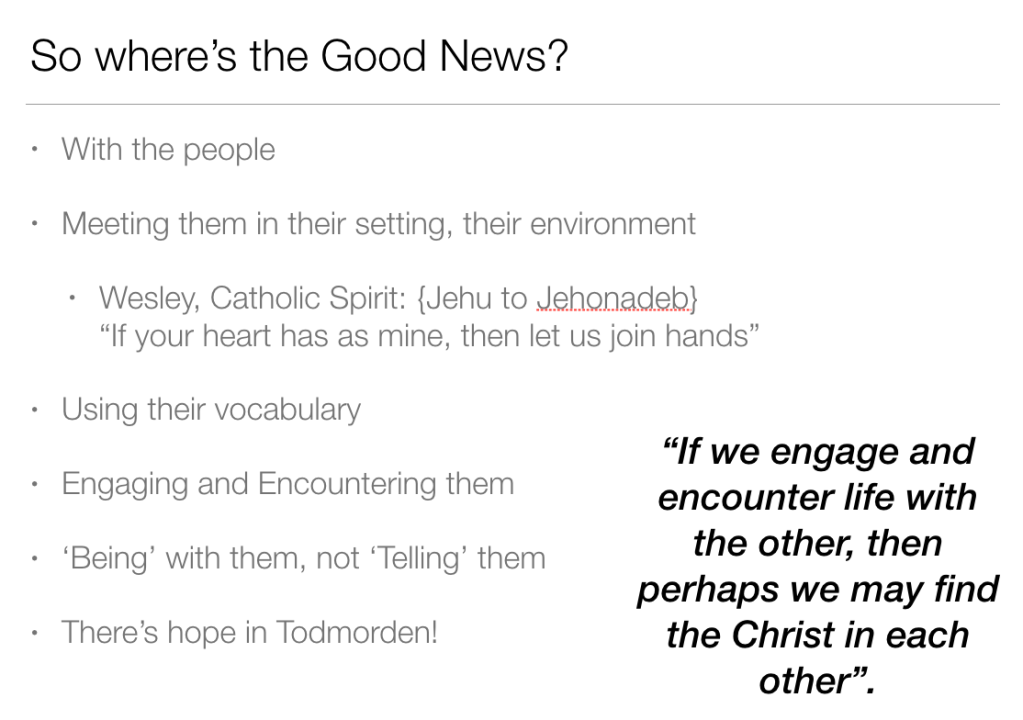
For where others see the church in decline, I see great hope in Todmorden.